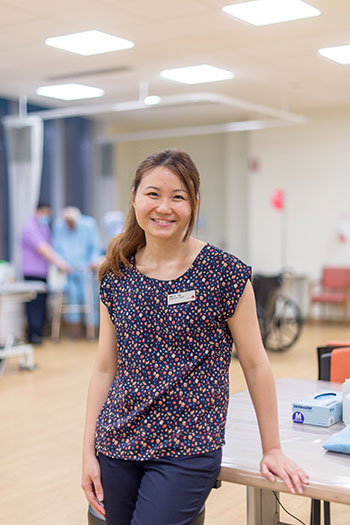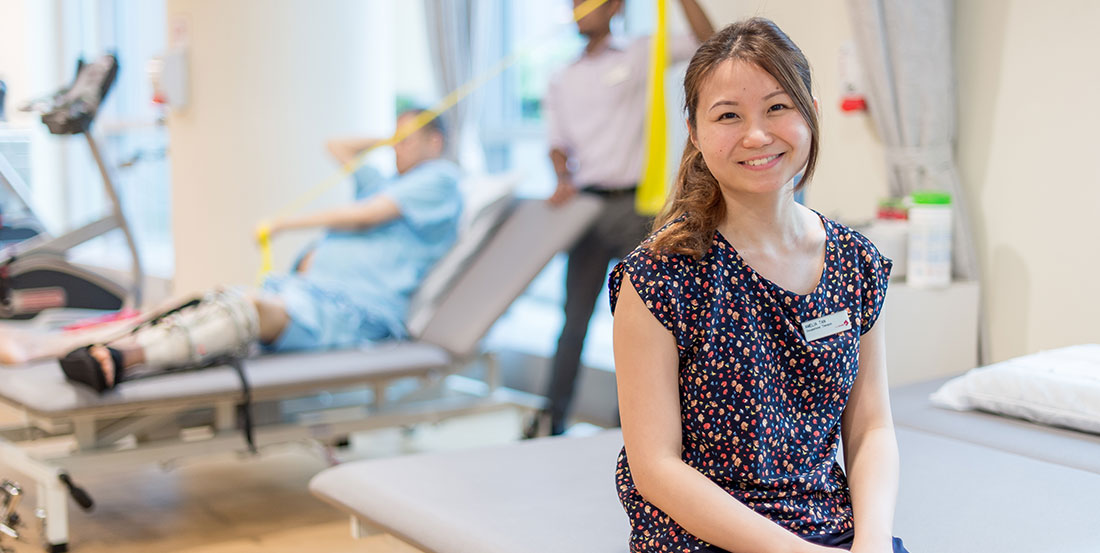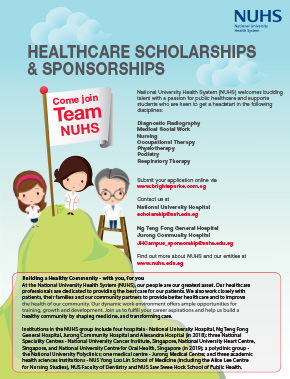Occupational therapy aims to build and maintain a person’s lifelong capacity to perform everyday tasks and roles essential to daily living. These tasks include self-care, leisure and work. Amelia Tan, an occupational therapist with Ng Teng Fong General Hospital (NTFGH), which is part of the National University Health System (NUHS), shares more about her meaningful career. Amelia was also the recipient of the Health Science Scholarship (Overseas), which is now known as the Healthcare Merit Scholarship.
What does an occupational therapist do?
The patients we often assist have lost their functional abilities after an injury or disability. An operation by the doctors, for example, would be the first critical part of care and treatment. Following the procedure, patients usually still have difficulty getting out of bed, putting on their clothes, showering themselves, and perhaps being able to scoop up their grand-kids from the floor.
This is where occupational therapists come in! We are with them throughout their journey of recovery. We find out each small detail of the activities that are meaningful to them in their daily lives and help them regain their abilities to engage in them.
We do so either by remediating or training motor and/or cognitive skills, or by modifying the activity or environment in which these activities are performed. Sometimes, for patients who cannot achieve independence in daily living, I train their caregivers on how to assist the patients in their everyday activities in preparation for their discharge from hospital.
Why did you decide to become an occupational therapist?
I used to accompany my younger sister, who has a developmental disability, to her occupational therapy sessions. I decided to pursue a career in occupational therapy when I saw how occupational therapists facilitate patients to engage in activities that they need or want to do in everyday life.

Amelia Tan Weiying
Healthcare Science Scholar
Occupational Therapist,
Ng Teng Fong General Hospital
What do you find meaningful about your work?
When we witness them leave the hospital, able to return to their homes, workplaces, and the community, the deep-seated fulfilment is indescribable. The clasping of hands when a patient thanks me or a handwritten note from someone who has difficulty writing, and the bright smiles from patients when I meet them in the ward is priceless, and the reason I pursued this path with NTFGH.
What are some of the opportunities afforded by the scholarship?
The scholarship piqued my interest as it allowed me to explore overseas undergraduate opportunities in Australia, which has some of the world’s leading institutions for undergraduate occupational therapy degrees. It provided me with the freedom to explore additional research-based and educational programmes, without having to worry about funding my university expenses. This translated into a much more enriching and fulfilling university experience, where I picked up knowledge and skills relating to research and teaching. I also had the privilege to spend more time on personal development, building relationships, and even sporting skills!
Additionally, the scholarship has also provided me with opportunities to meet other like-minded scholars who are similarly passionate about our respective allied health professions. It is always very encouraging to connect with other scholars and share about our respective struggles or hopes about our profession. Sometimes, this is a much-needed booster to re-ignite the fresh graduate spark of inspiration and excitement!
How has an overseas education enabled you to execute your duties better?
The additional research-based programmes and multiple fieldwork opportunities available allowed me to hone my knowledge and skills in various practice areas (acute hospitals, private paediatric clinics, schools) and for various client populations.
Clinical practice in Australia also meant that rapport building and effective communication with the predominantly Caucasian clients, families, and even colleagues or supervisors was initially challenging. However, it ingrained in me the importance of effective communication with my patients and trained me to readily accept diversity of cultures among patients. This is why I take great joy and pride in picking up vocabulary in Malay and Hokkien. It enables me to better connect with my patients, to understand their particular needs and minute details of their home environment or daily routines, which I might otherwise have missed out on.
What can scholar recipients look forward to in a career with NUHS?
I have spent the past three years in NTFGH. Some of my colleagues who studied and did their clinical placements locally tell me that we have a very supportive working environment in Singapore, and I am not surprised! Perhaps due to the nature of our department being relatively young, there is much potential for growth and development, accompanied by an openness to suggestions and adequate flexibility.
What would you say to aspiring occupational therapists?
Occupational therapy is ultimately a service. When you are constantly interacting with people who are sick or unwell, or who have loved ones who are sick or unwell, there is bound to be moments of great frustration. Our job is physical in nature, so it can be physically tiring after a day’s work.
But it is worth it. All it takes is for one patient to catch you by surprise when they are finally able to button their own shirt, or drink from a cup by themselves. If you have a desire to help someone live their life or to walk with them in their journey of recovery, become an occupational therapist! There are patients out there who need you!

